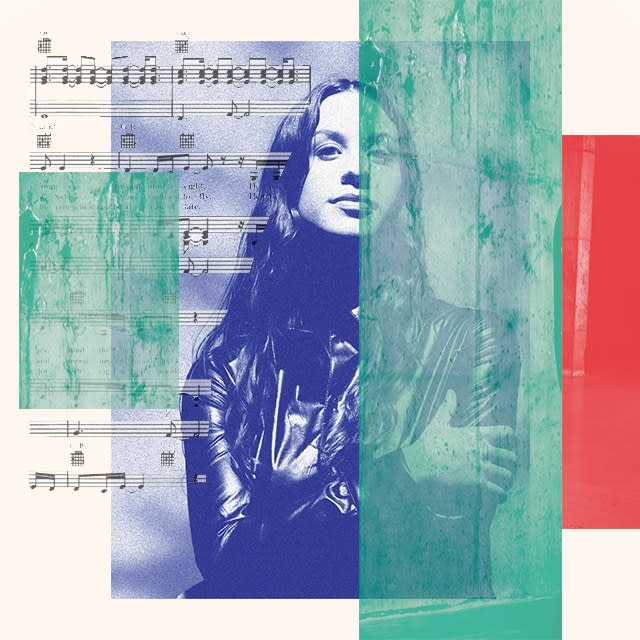With Jagged Little Pill, Broadway Updates a ’90s Classic

It’s the first cool day of autumn, and I’m in a rehearsal space high above 42nd Street in Manhattan, watching the cast and crew of the Broadway musical Jagged Little Pill run through a harrowing scene. Kathryn Gallagher (recently seen in a supporting role on the TV show You), playing a distraught high schooler named Bella, is curled in the corner of a sofa as she recounts a sexual assault to two classmates, Frankie (Celia Rose Gooding) and Jo (Lauren Patten). Bella has to go to the police, they insist. She scoffs. “They never believe anyone anyway.” Behind me, Sean Allan Krill, who plays Frankie’s father, inhales sharply. “This part just kills me,” he mutters. Later, Gallagher apologizes to me that it was such a disturbing rehearsal. Then again, it’s a heavy show. Patten, standing nearby, jokes:
“Deep scenes only in Jagged!”
Now in previews at the Broadhurst Theater after a 2018 run at the American Repertory Theater in Cambridge, Jagged Little Pill, based on Alanis Morissette’s 1995 album, is “an emotionally exhausting watch,” says Diablo Cody, who penned the book. The production, directed by Tony Award winner Diane Paulus, deftly weaves big themes—rape culture, opioid addiction, transracial adoption—into an Ice Storm–esque tableau of emotional alienation in suburban Connecticut.
At the center of things is Frankie’s mother, MJ (Elizabeth Stanley, brittle and very funny), whose past trauma is finally catching up with her. She self-medicates with yoga and illegally procured painkillers, and ices out her husband, Steve, who takes her sudden downturn personally. Frankie, meanwhile—adopted, bisexual, the only black member of her white-bread family—is a social-justice warrior who proves less than principled when it comes to her romantic entanglement with the guileless Jo. And Frankie’s brother, Nick (Derek Klena), is a Harvard-bound golden boy at an ethical crossroads.
None of these specifics, of course, were part of the original album; Cody grafts the lyrics onto a very 2019 story line. “It’s not a typical jukebox musical,” she says. “The songs are telling a real story; they’re not shoehorned into some other narrative.” She has created something new that’s also true to Jagged’s let-it-all-hang-out, confessional essence: a cautionary tale about the pitfalls of repression, the danger of hiding behind perfect façades, presented with plenty of wry, dark humor. Everyone is damaged; no one is beyond redemption.
For Morissette, the musical has also been a means of reclaiming the album that made her a star. “Reclaiming is a great word for it,” she says over the phone from Los Angeles. Although it netted its then-21-year-old creator four Grammys and sold 33 million copies worldwide, Jagged remains one of the more polarizing cultural artifacts of the ’90s. Detractors objected to Morissette’s background as a teen pop act in her native Canada; her unruly hair; her off-putting voice; the vitriol of her first single, “You Oughta Know,” a blistering missive to a fickle ex-lover. Alanis-haters were of two camps: She was either a hysterical she-wolf or a phony, co-opting the Riot Grrrl movement to sell inauthentic rage to the masses.
The public flogging took a toll on the young singer, who found the “white-hot heat of fame” isolating and discombobulating. The musical will no doubt expose a new generation—unburdened by ’90s baggage—to Jagged. Morissette loves that the production lets the audience “move some energy,” she says, and even she tears up when she hears actors performing her songs: “I’m having an empathetic, visceral response in a way I couldn’t when I was the one singing.” Processing the show’s themes with the cast and crew has been something like group therapy. Theater is the antidote to solitude. “We’re all witnessing each other,” says Morissette. “We’re wildly greater than the sum of our parts.”
Originally Appeared on Vogue

